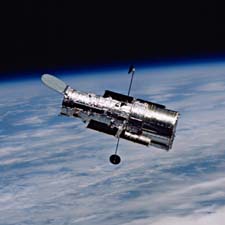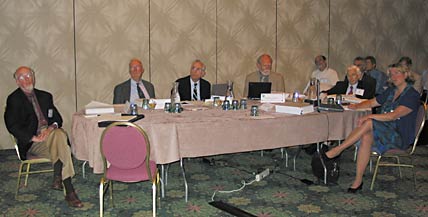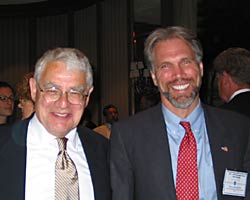
The Hubble Space Telescope, seen here after its March 2002 servicing, could cease operations well before its successor, the James Webb Space Telescope, is in orbit. Astronomers are pleading with NASA managers to keep Hubble going as long as possible.
Courtesy NASA.
The Hubble Space Telescope's days are numbered, and astronomers aren't happy. Thanks to periodic repairs and upgrades, Hubble has been at the forefront of scientific discovery since its launch in April 1990 — even though its first 3½ years were marred by optical problems. "HST is the Energizer Bunny of astronomy," says John P. Huchra (Harvard-Smithsonian Center for Astrophysics). But NASA can't afford to keep HST going and going while also funding the development of new orbiting observatories such as the James Webb Space Telescope, slated for launch in 2011 as astronomers' highest-priority project for the early 21st century. So the agency is making plans to terminate Hubble's mission around the end of this decade. At a sometimes contentious meeting near NASA headquarters in Washington, DC, yesterday, many astronomers pleaded with the agency to grant the telescope a stay of execution.
Three issues lie at the heart of the debate. First, Hubble has unique capabilities for ultraviolet and visible-light astronomy that will not be replaced by any other planned mission for 10 to 20 years (Webb is designed mainly for infrared imaging and spectroscopy). Second, Webb hasn't yet moved much beyond the drawing board and may not be ready for launch until the middle of the next decade, leaving astronomers with no space telescope at all for several years if Hubble shuts down by 2010. And third, Hubble is more than just a telescope. "HST is widely recognized as an extraordinary scientific, educational, and inspirational national asset," wrote Garth Illingworth (University of California, Santa Cruz) and Michael Shull (University of Colorado) in a letter soliciting input from fellow astronomers. In other words, it is an icon.
Recognizing Hubble's scientific productivity, prestige, and popularity, the US Congress has asked NASA to reexamine its plan for transitioning from Hubble to Webb, acknowledging that more money may be needed to keep the former operating. Anne Kinney (NASA Headquarters) appointed a panel chaired by John N. Bahcall (Institute for Advanced Study) to study all available options. Yesterday's open meeting of the panel drew about 100 astronomers, NASA managers, astronauts, and journalists.

The panel charged with determining how best to transition from the Hubble Space Telescope to the James Webb Space Telescope listens to testimony at its public meeting in Washington, DC, on July 31, 2003. Seated around the table, from left to right, are Christopher McKee (University of California, Berkeley), Nobel laureate Charles Townes (also UCB), panel chair John Bahcall (Institute for Advanced Study), Barry Barish (Caltech), Astronomer Royal Martin Rees (Cambridge University, UK), and Jacqueline Hewitt (MIT).
S&T photo by Rick Fienberg.
Kinney reminded attendees that NASA has already extended Hubble's lifetime beyond the originally planned 15 years by agreeing to fund another servicing mission in 2005, during which shuttle astronauts will install two new instruments and replace balky spacecraft components. Back in 1990, the 2005 shuttle mission was anticipated to return the telescope to Earth for display in the National Air and Space Museum. But after last February's Columbia disaster, NASA considers that option too risky. Instead, the agency is investigating the possibility of attaching a small rocket to Hubble and using it to crash the telescope into an uninhabited area. It cannot be allowed to reenter the atmosphere on its own, because some parts — especially the 2.4-meter-diameter primary mirror — might survive the plunge and kill or injure someone on the ground. And NASA refuses to boost Hubble into a much higher orbit to delay its reentry for decades. As Kinney explained, "We're not going to leave a problem for future generations."

Among those who testified in support of continuing Hubble operations as long as possible were Riccardo Giacconi (left) and Steven Beckwith, former and current directors, respectively, of the Space Telescope Science Institute. Giacconi won the 2002 Nobel Prize in physics for his contribution to the development of X-ray astronomy.
S&T photo by Rick Fienberg.
It remains unclear whether a retrorocket could be attached robotically using an expendable launcher or if it would have to be done by shuttle astronauts. What is clear is that such a rocket cannot be ready in time for the 2005 servicing mission. This means there's a good chance the shuttle will have to return to Hubble one last time, perhaps around 2008 or 2009. If so, many of the astronomers who spoke to the Bahcall panel yesterday would like to see another round of upgrades to extend the observatory's lifetime into the next decade.
"If we don't do everything we can to keep Hubble operating until we're sure JWST works, we will look like fools," said Riccardo Giacconi (Associated Universities, Inc.), former director of the Space Telescope Science Institute. Bruce McCandless (Lockheed-Martin), one of the astronauts who deployed Hubble in 1990, added, "A spacecraft in orbit is worth two on the drawing board." Others, however, testified that Hubble is yesterday's technology, and that important new discoveries are more likely to come from Webb and other missions designed with today's technology.
Most of the testimony presented to the Bahcall panel on July 31st was given by professional researchers and is available online at the HST-JWST Transition Plan Review Web site. The panel also welcomes input from amateur astronomers, science teachers, and others who feel strongly about where space astronomy should go in the next decade or two. I was grateful for the opportunity to offer my own comments to Bahcall and his colleagues yesterday in Washington.
Whatever the Bahcall panel recommends, it will be up to Congress to decide whether to give NASA some extra money to keep Hubble operating into the next decade. So if you're a US taxpayer, you might wish to let your representatives on Capitol Hill know your opinion. You can contact members of the House and Senate online.
 0
0
Comments
You must be logged in to post a comment.